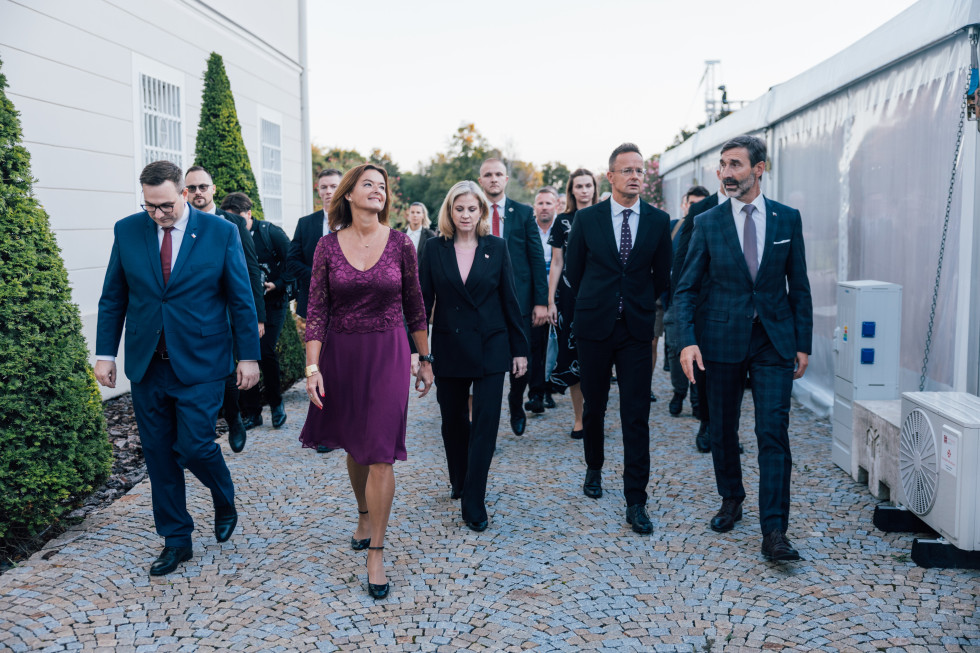At the meeting of Central 5 foreign ministers, Minister Fajon emphasises importance of dialogue and EU unity

Minister Fajon at the meeting of foreign ministers of the informal C5 group | Author Ministrstvo za zunanje in evropske zadeve
The ministers exchanged views on current European issues and broader international topics, including the situation in Gaza and transatlantic relations. Minister Fajon said that for Slovenia, as a country in the heart of Europe, cooperation with Central European countries is crucial, as we are linked not only by geographical, historical, cultural and political ties, but also by common challenges that can only be successfully addressed together. She added: “The C5 meetings confirm our willingness to engage in dialogue even on issues on which our opinions differ somewhat. The exchange of views and positions can also help with coordination at EU level, which is crucial for decision-making in the EU's common foreign and security policy.”
“I am particularly pleased that the C5 countries place such importance on EU enlargement. All the ministers agreed that enlargement must remain our political priority. In this context, we emphasise the importance of ensuring stability and prosperity in the Western Balkans and we support the countries of the region on their path to joining the European family,” Minister Fajon stressed. She also reminded her fellow ministers of the Slovenian-German initiative that would empower the EU Council to take decisions on opening individual negotiation clusters with candidate countries on the basis of a qualified majority. This would simplify the accession process, make it more effective, and, above all, speed it up—without lowering EU standards.
Regarding Ukraine, the ministers agreed that it should continue to be supported. They advocated a lasting and just peace based on the UN Charter. Minister Fajon pointed out that the EU must participate in negotiations on European security and added that only Ukraine can decide on its territorial integrity. “Unity and pressure on Russia to stop the war in Ukraine are now more important than ever.” She also expressed Slovenia's support for opening the first negotiation cluster with Ukraine and Moldova, stating that this would recognise their progress in reforms and serve as an important incentive on the path to EU membership.
During the discussion on the situation in Gaza, Minister Fajon stated that Israel's violations of international humanitarian law are beyond dispute. Due to the EU's failure to condemn these actions, Slovenia has introduced several national measures against Israel. At the same time, she emphasised that “real change is only possible through decisive action at EU level. People in Gaza are dying of hunger while waiting for food. Every day that passes without action undermines the EU's credibility worldwide, creating the impression that serious violations of international law carry no consequences. This sets a dangerous precedent for the future which we cannot and must not allow.” Reiterating her call for an immediate and lasting ceasefire, the implementation of the two-state solution and the release of all hostages, she urged her colleagues to follow Slovenia's example and recognise Palestine.
When discussing migration, the ministers agreed that the control of the EU's external borders needs to be improved. Slovenia advocates a comprehensive, EU-wide approach to migration management that addresses the root causes of irregular migration. “We emphasise the need for the full implementation of the Frontex mandate, which should be expanded to enable the agency to provide comprehensive support for the return of migrants from third countries to their countries of origin. These procedures must be based on respect for international law and human rights,” added Minister Fajon.
The informal C5 group was established in 2020. Minister Fajon hosted the previous meeting in Ljubljana in March 2024.
Nujno je, da ti postopki temeljijo na spoštovanju mednarodnega prava in človekovih pravic,« je med drugim še povedala Fajonova.
Neformalna skupina C5 je nastala leta 2020. Zadnje srečanje je marca 2024 v Ljubljani gostila ministrica Fajon.

